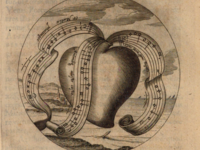
What does feeling sound like? What do we hear when we turn our ears to the past and listen to the sounds of emotional experience? These questions are at the core of Hearing Emotion’s History: Interdisciplinary Perspectives on Sacred Music and the History of Emotions.
In this day-long, interdisciplinary conference, musicologists and historians of emotion will convene to discuss the vital roles that sound and music played in the emotional lives of past people. Specifically, conference participants will consider the emotionality of the sacred as it was forged vis-à-vis the sonic arts. Among their diverse questions, participants ask: how do our imposed boundaries between the sacred and the secular break down—or how are they reinforced—around affective experiences of sound and music? Interdisciplinary work that places musicology and the history of emotions in conversation with one another is relatively rare, and conferences on the subject tend to occur only in Europe and Australia—locations where the history of emotions has taken a firmer root in academic scholarship. Hearing Emotion’s Histories brings together an international group of musical and emotional thinkers on this side of the globe in order to discuss how the sounds of our musical past also disclose and define the histories of our emotions.
Organized by ISM Fellow Thomas Marks
Conference Speakers:
- Tim Carter (University of North Carolina, Chapel Hill)
- Roger Matthew Grant (Wesleyan University)
- Tom Marks (Yale ISM)
- William Reddy (Duke University)
- Monique Scheer (University of Tübingen)
- Bettina Varwig (Emmanuel College, Cambridge University)
- Juliane Brauer (Center for the History of Emotions, Planck Institute)
- John Corrigan (Florida State University)